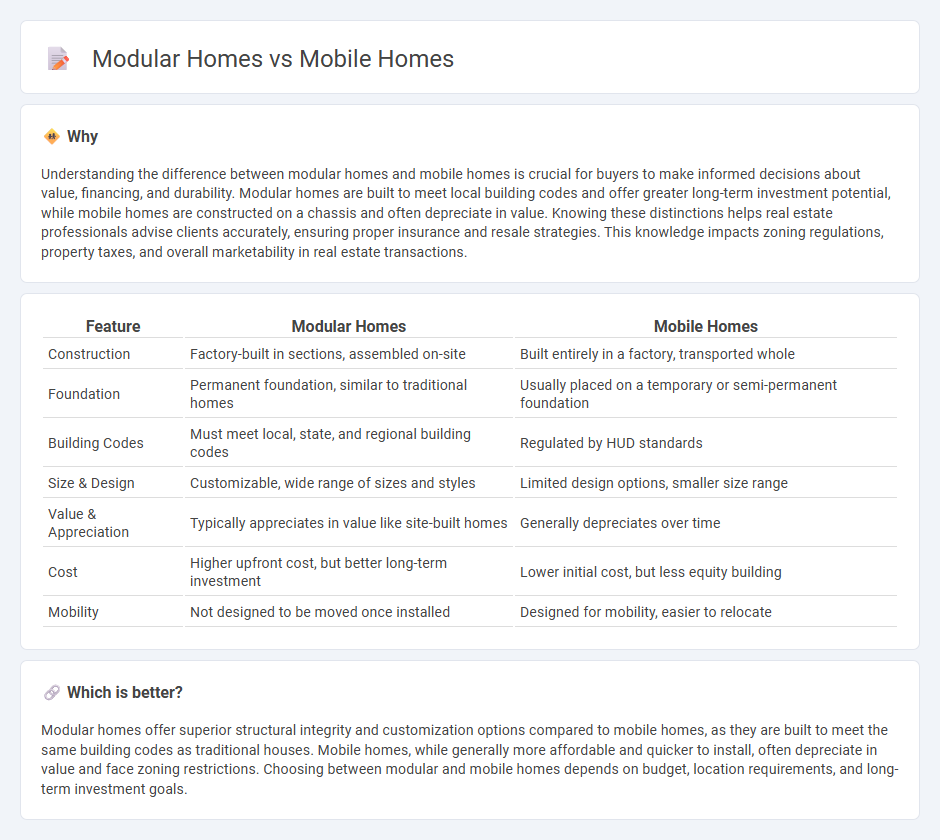
Modular homes are built in sections in a factory setting and then assembled on-site, offering durability and compliance with local building codes similar to traditional houses. Mobile homes, also known as manufactured homes, are constructed entirely in a factory and transported to their location, often featuring lower costs but varying standards of quality and zoning restrictions. Explore the key differences between modular and mobile homes to determine the best fit for your housing needs.
Why it is important
Understanding the difference between modular homes and mobile homes is crucial for buyers to make informed decisions about value, financing, and durability. Modular homes are built to meet local building codes and offer greater long-term investment potential, while mobile homes are constructed on a chassis and often depreciate in value. Knowing these distinctions helps real estate professionals advise clients accurately, ensuring proper insurance and resale strategies. This knowledge impacts zoning regulations, property taxes, and overall marketability in real estate transactions.
Comparison Table
| Feature | Modular Homes | Mobile Homes |
|---|---|---|
| Construction | Factory-built in sections, assembled on-site | Built entirely in a factory, transported whole |
| Foundation | Permanent foundation, similar to traditional homes | Usually placed on a temporary or semi-permanent foundation |
| Building Codes | Must meet local, state, and regional building codes | Regulated by HUD standards |
| Size & Design | Customizable, wide range of sizes and styles | Limited design options, smaller size range |
| Value & Appreciation | Typically appreciates in value like site-built homes | Generally depreciates over time |
| Cost | Higher upfront cost, but better long-term investment | Lower initial cost, but less equity building |
| Mobility | Not designed to be moved once installed | Designed for mobility, easier to relocate |
Which is better?
Modular homes offer superior structural integrity and customization options compared to mobile homes, as they are built to meet the same building codes as traditional houses. Mobile homes, while generally more affordable and quicker to install, often depreciate in value and face zoning restrictions. Choosing between modular and mobile homes depends on budget, location requirements, and long-term investment goals.
Connection
Modular homes and mobile homes both offer affordable and flexible housing solutions, constructed using prefabricated components but differ in building codes and permanence: modular homes are built to local building codes and assembled on-site, while mobile homes comply with HUD standards and are transportable. Both types leverage factory-built construction to reduce costs and construction time compared to traditional homes. Their connection lies in providing efficient, scalable, and customizable housing options catering to diverse lifestyle and budget needs.
Key Terms
Foundation
Mobile homes typically feature a pier and beam foundation that is elevated above ground, allowing for easy transportation and relocation. Modular homes, constructed in sections in a factory, are placed onto permanent foundations such as basements or concrete slabs, providing enhanced stability and increased home value. Discover the key foundation differences that influence durability and investment potential in prefabricated housing by learning more today.
Building Codes
Mobile homes are built on a permanent chassis and must adhere to the federal HUD building codes, which focus on transportability and durability across varied locations. Modular homes, constructed in sections in factories, comply with local or state building codes identical to those applied to site-built homes, ensuring consistency in structural integrity and design standards. Explore further to understand how these regulatory differences impact your housing investment and construction timeline.
Mobility
Mobile homes, also known as manufactured homes, are built on a permanent chassis with wheels, allowing them to be transported easily and retaining their mobility. Modular homes, constructed in sections at a factory and assembled on-site, are fixed structures that cannot be relocated without complete disassembly, making them less mobile. Explore more differences and benefits of mobile and modular homes to determine which suits your lifestyle and housing needs.
Source and External Links
Flag City Mobile Home Community - TRG Living - Offers mobile home and RV lots with easy access to shopping, dining, and parks in Millington, TN, just 30 minutes north of Memphis.
Realtor.com - Millington, TN Mobile & Manufactured Homes for Sale - Lists mobile homes for sale in Millington, TN, with photos and detailed descriptions for buyers.
Dick Moore Housing - Manufactured Home Dealer - A family-owned dealer in Millington, TN, providing mobile, manufactured, and modular homes, financing, and setup services since 1958.
 dowidth.com
dowidth.com